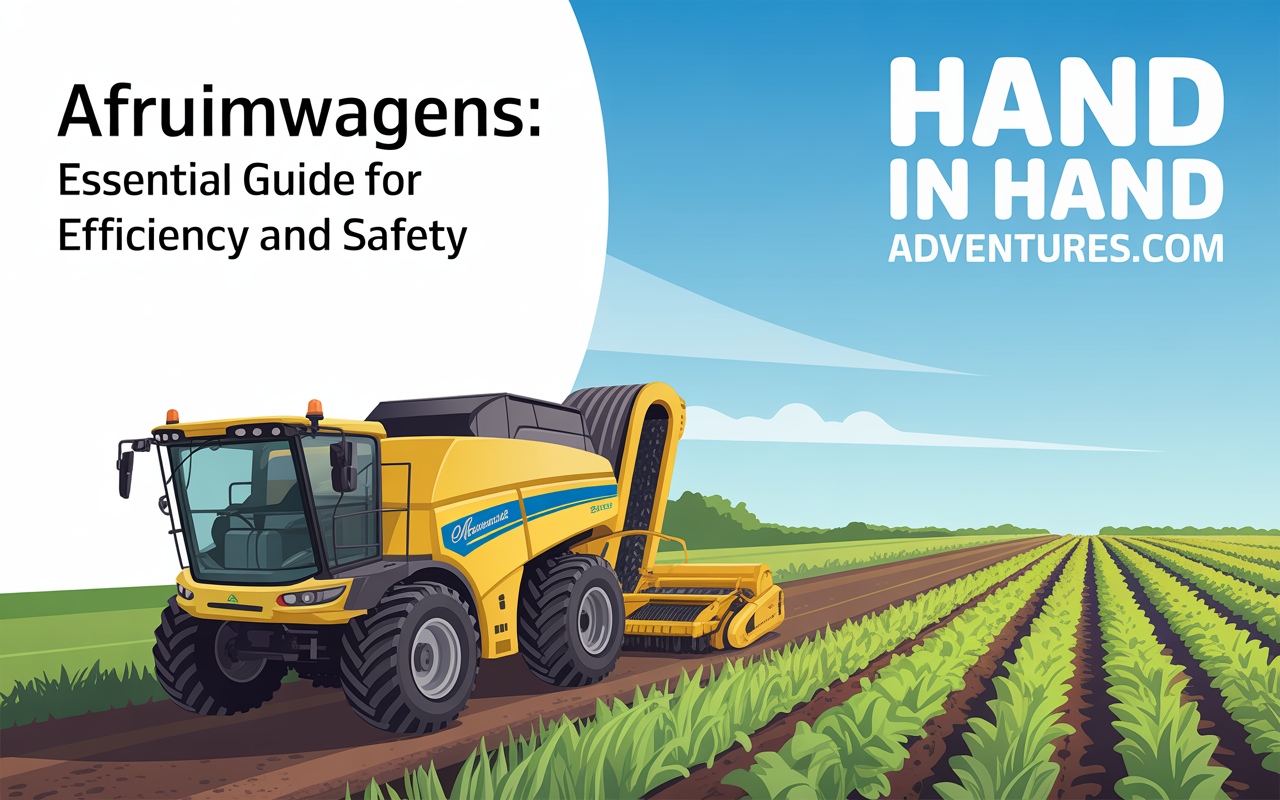Afruimwagens are indispensable tools across many industries where efficiency and safety must work hand in hand. Used in logistics, hospitality, healthcare, and manufacturing, these transport carts streamline workflows, reduce physical strain, and promote organized work environments. By offering versatile designs, Afruimwagens serve multiple functions, ranging from clearing workspaces to transporting goods, waste, or materials.
Interestingly, Afruimwagens are not only practical but also crucial for safety compliance. Workplaces that adopt them benefit from reduced injuries, improved time management, and smoother operations. Moreover, their adaptability makes them suitable for small businesses as well as large-scale industries.
By understanding Afruimwagens fully—how they work, their features, and their benefits—organizations can make informed choices that lead to long-term improvements in productivity and safety.
Understanding the Role of Afruimwagens
Afruimwagens function as multi-purpose transport carts designed to clear and carry materials effectively. They are often built from durable metals or high-quality plastics to withstand heavy use. Because they are designed ergonomically, workers can push or pull them without excessive strain.
In environments like restaurants, Afruimwagens clear tables quickly, ensuring faster turnover. Meanwhile, in warehouses, they move goods efficiently, reducing downtime. The consistent use of Afruimwagens translates into significant productivity gains, making them a backbone of streamlined operations.
Benefits of Afruimwagens in Daily Operations
One of the main advantages of Afruimwagens is their ability to minimize manual lifting. This reduces the risk of injuries, especially in industries where repetitive movements are common. Furthermore, Afruimwagens help organize workflows by designating a specific space for waste, tools, or materials.
Another benefit lies in time efficiency. With Afruimwagens, tasks that would otherwise require multiple trips can be completed in fewer movements. Consequently, employees spend less time transporting and more time focusing on essential responsibilities.
Lastly, Afruimwagens contribute to hygiene and cleanliness, particularly in healthcare and hospitality settings. By keeping areas clear of clutter, they create safer and more welcoming environments.
Types of Afruimwagens
Afruimwagens come in various designs, each tailored to specific needs. Some are simple flatbed carts, while others feature shelves or compartments for separating items. Certain models include bins designed for waste collection, while others emphasize lightweight mobility for quick tasks.
Industries often choose their Afruimwagens based on durability, mobility, and size. For example, stainless steel Afruimwagens are preferred in kitchens for their hygiene benefits, while heavy-duty plastic versions are common in warehouses.
The diversity of Afruimwagens ensures that every sector finds a suitable option for its unique requirements.
Material Choices in Afruimwagens
The choice of material impacts durability, weight, and maintenance. Stainless steel Afruimwagens are corrosion-resistant, making them ideal for food and medical settings. Plastic models, on the other hand, are lightweight and easy to clean, making them suitable for waste management and light-duty use.
Wooden Afruimwagens exist too, though less common, often seen in traditional or aesthetic-focused environments. Regardless of the material, the goal remains consistent: providing sturdy, long-lasting support for daily operations.
Ergonomics in Afruimwagens
Ergonomic design is vital because employees must push or pull Afruimwagens regularly. Handles positioned at the right height reduce strain on wrists and shoulders. Wheels that swivel smoothly allow easy navigation even in tight spaces.
By integrating ergonomic principles, Afruimwagens protect workers from fatigue and injury, while simultaneously improving overall efficiency. Investing in ergonomics leads not only to healthier employees but also to greater productivity.
Safety Features of Afruimwagens
Safety cannot be overlooked when discussing Afruimwagens. Many models include brakes on wheels to prevent accidents on slopes or uneven floors. Rounded edges and smooth finishes reduce injury risks during use.
Additionally, weight distribution is considered in modern Afruimwagens. By ensuring stability, tipping hazards are minimized. These safety features make Afruimwagens a trustworthy tool in high-paced environments.
Afruimwagens in the Hospitality Industry
Restaurants, hotels, and catering services rely heavily on Afruimwagens. They help staff clear tables quickly, transport dishes efficiently, and maintain hygiene. In large events, Afruimwagens reduce chaos by providing structured clearing and transport methods.
The hospitality industry values them not only for practicality but also for customer satisfaction. Quick and discreet clearing ensures smoother service, leaving guests with a positive impression.
Afruimwagens in Healthcare
Hospitals and clinics also benefit from Afruimwagens. Whether used for transporting linens, medical supplies, or waste, they support strict hygiene standards. Medical-grade Afruimwagens are often equipped with compartments that separate clean and contaminated items.
Because time is critical in healthcare, Afruimwagens allow staff to complete tasks faster while maintaining safety. Their role in preventing cross-contamination cannot be overstated.
Afruimwagens in Warehouses and Logistics
In warehouses, Afruimwagens streamline operations by reducing the need for forklifts in smaller tasks. Employees can quickly transport boxes, tools, or packaging materials. Their mobility makes them essential for tight storage areas where large vehicles cannot maneuver.
Logistics companies also use Afruimwagens for last-mile organization. By moving packages efficiently, they ensure timely deliveries and reduced errors.
Afruimwagens in Manufacturing
Factories use Afruimwagens for transporting raw materials, semi-finished products, or tools. They support lean manufacturing by reducing unnecessary movement. Moreover, Afruimwagens keep workstations uncluttered, contributing to improved safety standards.
Because they can be customized for specific processes, Afruimwagens become integral to production lines. Their adaptability ensures smoother workflows across manufacturing environments.
Environmental Impact of Afruimwagens
Afruimwagens also contribute to sustainability. Reusable carts reduce dependency on disposable containers, cutting down waste. Furthermore, durable models last for years, lowering replacement needs and environmental costs.
When made from recyclable materials, Afruimwagens align with eco-friendly workplace initiatives. Organizations can, therefore, use them not just for efficiency but also for greener operations.
Maintenance of Afruimwagens
Proper maintenance extends the lifespan of Afruimwagens. Regular cleaning prevents buildup of dirt or grease. Checking wheel functionality ensures smooth operation, while inspecting brakes enhances safety.
Simple routines, such as tightening loose screws or lubricating moving parts, keep Afruimwagens in top condition. By committing to maintenance, organizations save money and avoid workflow disruptions.
Choosing the Right Afruimwagens
Selecting Afruimwagens requires considering load capacity, mobility, material, and ergonomics. The environment where it will be used also influences the choice. For instance, kitchens prioritize hygiene, while warehouses prioritize durability.
Businesses should also assess future scalability. A well-chosen Afruimwagen adapts to growing demands, preventing the need for frequent replacements.
Cost Considerations of Afruimwagens
While initial investment varies, Afruimwagens deliver excellent value over time. Their ability to improve efficiency and reduce workplace injuries often outweighs purchase costs.
Moreover, maintenance is relatively low-cost compared to larger transport equipment. For budget-conscious businesses, Afruimwagens provide a practical balance between affordability and functionality.
Innovations in Afruimwagens
Modern Afruimwagens now feature smart designs, such as modular shelves or foldable structures. Some models even integrate digital tracking systems for inventory management. Innovations like these make Afruimwagens adaptable to evolving industrial demands.
Such advancements ensure Afruimwagens remain relevant in a future where efficiency and technology intersect.
Conclusion
Afruimwagens serve as more than just transport carts—they represent efficiency, safety, and reliability across multiple industries. By supporting workflows, reducing physical strain, and enhancing hygiene, Afruimwagens prove their indispensable role in modern operations.
Whether used in a restaurant, warehouse, or hospital, their benefits extend beyond convenience. They ensure smoother workflows, protect employees, and contribute to sustainable practices. Organizations that invest in Afruimwagens not only improve efficiency but also strengthen workplace safety and satisfaction.

